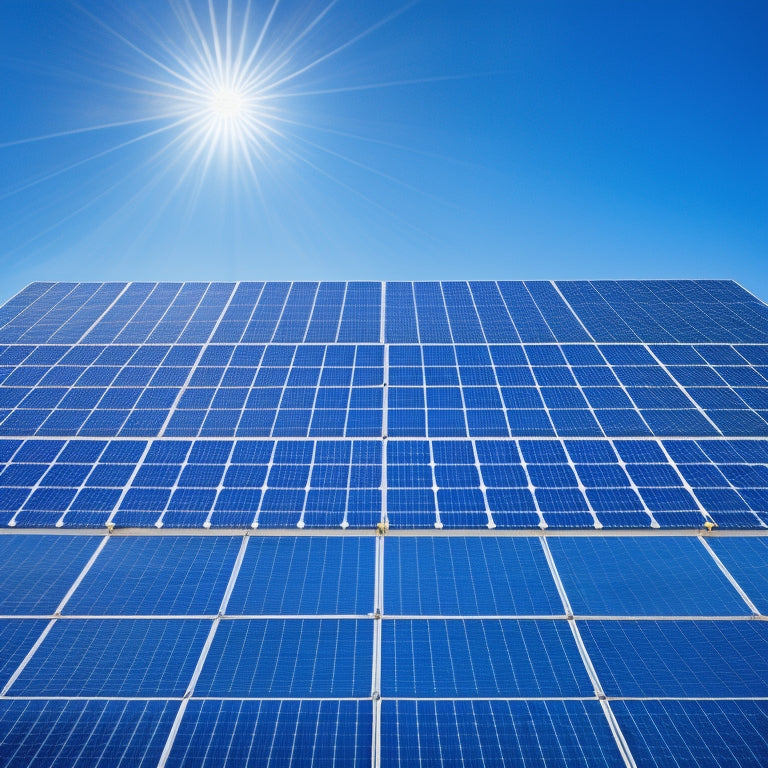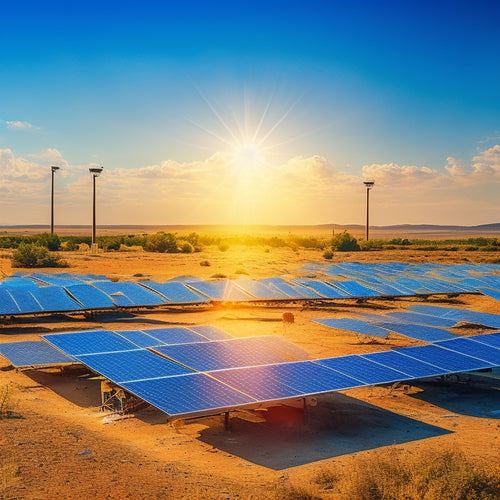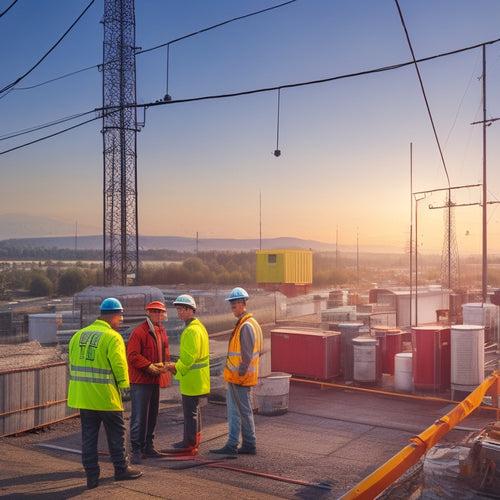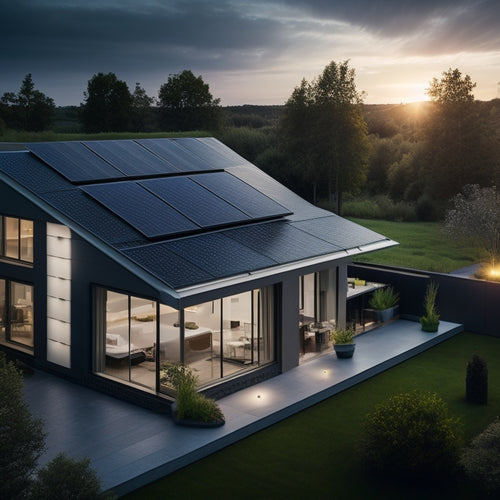
Top Ten Solar Panels
Share
When searching for the top ten solar panels, you'll want to evaluate those that enhance your property value fast, reduce your carbon footprint, and provide efficient energy production. Look for panels with a high temperature coefficient rating, ensuring peak performance in high temperatures. Your roof's direction matters too - south-facing roofs receive the most direct sunlight, but even less-than-ideal orientations can yield considerable energy savings with proper placement. Higher energy density cells convert more sunlight into electricity, increasing power output per unit area. Now, investigate the top-performing solar panels that can take your energy efficiency to the next level.
At a Glance
- When selecting top solar panels, consider temperature coefficient rating for optimal performance in high temperatures.
- Look for high-efficiency panels with low temperature coefficient ratings to maintain peak performance.
- Energy density and power output are crucial, with higher wattage ratings and premium/bifacial panels offering the highest efficiency.
- South-facing roofs with ideal orientation (between southeast and southwest) receive the most direct sunlight, maximizing energy absorption.
- Solar tracking systems can increase output by up to 45%, but fixed-mount systems offer a budget-friendly alternative.
Boosts Property Value Fast
You'll likely see a significant increase in your property's appeal when you install solar panels, which can lead to a faster sale and higher selling price.
By integrating solar panels into your property's design, you'll enhance its curb appeal, making it more attractive to potential buyers.
Installing rooftop solar panels can also increase your home's energy efficiency and reduce your reliance on the grid, solar panel installation for homes.
As a result, you can expect a substantial enhancement to your property's value, setting it apart from similar properties in the area.
Increased Property Appeal
Installing solar panels on your property can greatly enhance its curb appeal, making it more attractive to potential buyers and increasing its value in a short span of time. This is especially true if you're considering selling your property in the near future.
With solar panels, you can reap the benefits of increased property appeal, which can lead to a faster sale and a higher selling price. Additionally, you'll enjoy residential energy savings from reduced electricity bills, which can be a major selling point for potential buyers.
By switching to Renewable Energy Solutions, you'll not only reduce your carbon footprint but also contribute to a sustainable future. Furthermore, solar power installation provides a modern, sustainable alternative to traditional energy infrastructure, which is often outdated and inefficient.
You'll also benefit from solar panel incentives, such as tax credits and rebates, which can offset the initial installation cost. According to the National Renewable Energy Laboratory, solar panels can increase your property value by up to $15,000.
This means that not only will you save money on energy bills, but you'll also enhance your property value, making it more attractive to potential buyers. By installing solar panels, you'll be making a smart investment in your property, increasing its appeal, and ultimately, its value.
Enhanced Curb Appeal
Solar panels not only increase your property's energy efficiency but also enhance its visual appeal. When you install solar panels, you're not just reducing your reliance on the grid, you're also making a statement about your commitment to sustainability and design aesthetics.
By choosing a system that integrates seamlessly with your home's structural style, you can elevate your property's curb appeal and increase its value. With professional solar panel installations, you can guarantee a safe and secure process that comes with a warranty and ongoing maintenance support Renewable Energy Solutions, giving you peace of mind and allowing you to enjoy the benefits of solar energy.
Consider your neighborhood trends and the visual integration of your solar panels with your landscaping considerations. A well-designed system can blend in with your surroundings, while a poorly installed one can stick out like a sore thumb. Choose a system with color choices that complement your home's exterior, and consider the installation visibility.
With energy independence and sustainable investments on the rise, a well-designed solar panel system can be a major selling point for your property, increasing its residential appeal and value. By investing in a high-quality system, you're not just saving money on energy bills, you're also making a smart investment in your home's future.
Reduces Carbon Footprint Fast
You're switching to a clean energy source that's eco-friendly, reducing your reliance on fossil fuels and mitigating climate change.
By opting for high-performance solar panels from top-rated brands like SunPower, you'll be ensuring maximum energy efficiency and minimizing your carbon footprint.
By installing solar panels, you'll greatly lower your emissions today, contributing to a healthier environment.
As you generate electricity from sunlight, you'll be producing zero carbon emissions, making a tangible impact on reducing your carbon footprint fast.
Eco-Friendly Energy Source
One significant advantage of solar panels is their ability to generate electricity without harming the environment. You'll be reducing your carbon footprint fast by switching to solar energy, which is a renewable energy solution that's clean and sustainable.
Solar panels utilize the sun's energy, converting it into electricity that powers your home or business. This eco-friendly energy source isn't only good for the planet, but it also provides you with independence from traditional energy sources.
As you investigate solar energy benefits, you'll realize that solar panels require minimal maintenance and can last for decades. They're also highly durable and can withstand various weather conditions.
By installing solar panels, you're contributing to a cleaner environment and reducing your reliance on fossil fuels. With solar energy, you'll enjoy lower energy bills and a reduced carbon footprint, giving you peace of mind and a sense of freedom.
Lower Emissions Today
By utilizing the power of the sun, solar panels enable you to greatly reduce your carbon footprint, making a tangible impact on the environment.
You'll be contributing to a cleaner, healthier planet for future generations. With solar panels, you can lower emissions today and start reaping the benefits of energy savings. You'll see a significant decrease in your utility bills, and with government rebates and solar incentives, the cost of installation is more affordable than ever.
As a renewable investment, solar panels align with your sustainability goals, helping combat climate change.
You'll be reducing your reliance on the grid, increasing energy independence, and improving grid reliability. Solar panels are an essential step towards a cleaner, more sustainable future.
By choosing solar, you're taking a proactive approach to reducing your environmental impact. You'll be doing your part to protect the planet while enjoying the financial benefits of renewable energy.
Make the switch to solar today and start making a difference.
Efficient Temperature Coefficient Rating
You'll want to look for a solar panel's temperature coefficient rating, which indicates how well it performs in high temperatures.
Heat tolerance testing reveals a panel's efficiency in extreme conditions, ensuring you get the most energy output.
When it comes to renewable energy, a high-efficiency solar panel can make a significant difference in reducing your carbon footprint.
The ideal operating range is essential, as it shows the temperature range where the panel operates at its best.
Heat Tolerance Testing
As solar panels operate in outdoor environments, they're bound to face sweltering temperatures that can impact their performance. Heat tolerance testing, also known as efficient temperature coefficient rating, is essential in evaluating a solar panel's thermal performance. This test assesses how well a panel can maintain its energy output under high temperatures.
| Temperature (°C) | Efficiency (%) |
|---|---|
| 25 | 20.0 |
| 40 | 18.5 |
| 60 | 16.2 |
As you can see from the table, a panel's efficiency decreases as the temperature increases. A higher temperature coefficient rating indicates that a panel can maintain its performance better under high temperatures. When choosing a solar panel, look for a low temperature coefficient rating to guarantee peak performance even in hot weather conditions. This is particularly important for those living in regions with high temperatures, as it directly affects the solar panel's durability and overall energy output.
Optimal Operating Range
Solar panels operate most efficiently within a specific temperature range, known as the ideal operating range. This ideal operating range varies between solar panel models, but generally falls between 59°F and 95°F (15°C and 35°C).
Operating within this range guarantees you'll get the most out of your solar panels, as it allows them to produce electricity at their maximum potential.
You should look for solar panels with a high temperature coefficient rating, as this indicates they'll maintain peak efficiency even when temperatures rise. A low temperature coefficient rating means the panel's performance will degrade more notably as temperatures increase.
When evaluating solar panels, consider the performance metrics that matter most to you, such as maximum power output and efficiency. Keep in mind that peak efficiency is essential, as it directly impacts the amount of electricity your solar panels can generate.
Check Your Roof's Direction
When checking your roof's direction, you'll want to verify it's oriented to maximize solar energy absorption. A south-facing roof is ideal, as it receives the most direct sunlight throughout the day.
Moreover, consider the importance of renewable energy systems and how they can benefit your home's energy efficiency.
In addition, it's crucial to note that off-grid energy solutions can also be a viable option.
If your roof doesn't face directly south, don't worry - a west- or east-facing roof can still generate significant energy.
Roof Orientation Matters
Your roof's direction greatly impacts the performance of your solar panel system. The ideal roof orientation for solar panels is between southeast and southwest, as this direction receives the most sunlight throughout the day.
However, if your roof doesn't face this direction, it's not the end of the world. You can still benefit from solar energy, but you'll need to take into account other factors that affect energy production.
The roof pitch, or angle, also plays a key role. A steeper pitch allows snow to slide off easily, reducing shading effects, but may require additional mounting hardware. A shallower pitch is more suitable for areas with minimal snowfall.
Shading effects from trees, buildings, or other obstacles can greatly reduce energy production. Assess your roof's surroundings to determine the best solar panel placement.
Keep in mind that even with less-than-ideal orientation, solar panels can still generate considerable energy savings. By understanding your roof's direction and mitigating shading effects, you can maximize your solar panel system's performance and enjoy the freedom of renewable energy.
Facing the Sun Directly
Because the sun rises in the east and sets in the west, a south-facing roof receives the most direct sunlight throughout the day. As you consider installing solar panels, it's essential to assess your roof's direction to maximize sun exposure. A south-facing roof receives direct sunlight for most of the day, making it perfect for solar panels.
If your roof faces east or west, you'll still receive significant sun exposure, but not as much as a south-facing roof.
If your roof doesn't face the best direction, don't worry. Solar tracking systems can be used to adjust the panels' angle and direction to capture more sunlight. These systems can increase energy output by up to 45%. However, they come at an additional cost. If you're on a budget, a fixed-mount system might be a more affordable option.
When evaluating your roof's direction, consider the surrounding environment, including trees, buildings, and other obstructions that might affect sun exposure.
Higher Energy Density Cells
You'll get more power from your solar panels with higher energy density cells, which can increase the amount of electricity generated per unit area.
This is because these cells can convert a larger percentage of sunlight into electrical energy, resulting in higher power output.
Increased Power Output
Within the domain of solar panel technology, researchers have made considerable progress in increasing power output by developing higher energy density cells. This breakthrough enables you to generate more electricity per unit area, making solar energy a more viable option for your energy independence.
Higher energy density cells have a direct impact on solar efficiency, which is measured by the amount of sunlight converted into electricity. With advancements in cell technology, manufacturers can now produce panels with higher wattage ratings, reducing the overall number of panels required for your solar installation.
Here's a comparison of the power output of different solar panels:
| Panel Model | Power Output (W) | Efficiency (%) |
|---|---|---|
| Traditional | 250 | 15.0 |
| High-Efficiency | 300 | 18.0 |
| Premium | 350 | 20.0 |
| Bifacial | 400 | 22.0 |
Frequently Asked Questions
Can I Install Solar Panels on a Metal Roof?
You can install solar panels on a metal roof, leveraging its advantages like durability and water resistance. However, consider the unique installation requirements, such as specialized clamps and flashed mounts, to guarantee a secure and watertight setup.
Do Solar Panels Work During a Power Outage?
"When in doubt, turn to the power of the sun!" You'll find that solar panels won't work during a power outage unless you have a grid connection with a battery backup, as standard panels prioritize solar panel efficiency over energy storage.
How Long Does It Take to Install Solar Panels?
You'll typically spend 1-3 days on the installation process, but the overall installation timeline can take 2-6 months, depending on permits, inspections, and your utility company's interconnection process, so plan ahead and stay patient!
Can I Monitor My Solar Panel's Performance Remotely?
You can monitor your solar panel's performance remotely using online portals or mobile apps, enabling real-time performance tracking and alerts, so you'll stay on top of your energy production and enjoy the freedom to optimize your system's output.
Are Solar Panels Resistant to Hail and Extreme Weather?
You're probably thinking, 'Will a hailstorm ruin my solar investment?' Rest assured, you're protected - most solar panels are designed to withstand hail damage and extreme weather conditions, ensuring weather durability and minimizing the risk of damage from Mother Nature's fury.
Explore More
You've narrowed down your options and are ready to utilize the power of the sun. On one hand, you're enthusiastic to reap the benefits of renewable energy, from enhancing your property value to reducing your carbon footprint. On the other hand, you're concerned about the technicalities, like efficient temperature coefficient ratings and your roof's direction. By considering these factors, you'll find the perfect solar panel for your needs, and soon you'll be basking in the glow of a sustainable future.
Related Posts
-

What Happens Without a Charge Controller in Solar Panels
Without a charge controller in your solar panel system, you risk overheating batteries due to overcharging, which can...
-

Smart Grid Technology Implementation Challenges
You'll encounter several challenges when implementing smart grid technology, particularly in cost management, scalabi...
-

Home Solar Battery
You're opting for a home solar battery that allows you to utilize the power of the sun during the day and use it at n...


